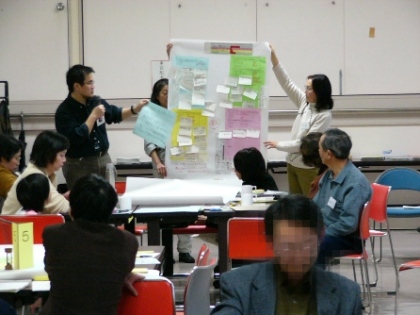Profile

- Research Subject
Social dilemma, Environmental Behavior, cooperation, consensus construction, social decision, citizen participation
- Research Fields
- Environmental Social Psychology
- Faculty - Division / Research Group / Laboratory
- Division of Human Sciences / Research Group of Behavioral Science / Laboratory of Behavioral Science
- Graduate School - Division / Department / Laboratory
- Division of Human Sciences / Department of Behavioral Science / Laboratory of Behavioral Science
- School - Course / Laboratory
- Division of Humanities and Human Sciences / Course of Human Sciences / Laboratory of Behavioral Science
- Contact
Office/Lab: E403
TEL: +81-11-706-4158
FAX: +81-11-706-4158
Email: ohnuma(at)let.hokudai.ac.jp
Replace “(at)” with “@” when sending email.Foreign exchange students who want to be research students (including Japanese residents) should apply for the designated period in accordance with the “Research Student Application Guidelines”. Even if you send an email directly to the staff, there is no reply.- Related Links
Lab.letters


What would a society with ideal waste disposal look like? Emphasizing processes leading to consensus-building
The crux of my research is the realization of cooperation in a large scale society. Take, for example, the policy making for the household waste management in Sapporo. We should not focus on the controversy such as whether the fee for garbage collection should be implemented or not; alternatively, we should find a common goal acceptable for everyone in which citizens can determine a shared recognition of their ideal society with respect to waste disposal. We attach weight to the processes to build a consensus, creating opportunities where groups and individuals having different interests and values can exchange their opinions.
Research methods consist of two processes: One is onsite surveys in which we make trips to garbage collection points in communities, and the other is experiments to demonstrate the influence of a social structure through role-playing games where we recreate certain situations. These interactive approaches between real society and simulated society are very essential characteristics of social psychology, which aims to reveal micro-macro dynamics of human beings and the societies.
Growing big at the crossroads where international researchers meet
Each society may have different aspects and theories for solving problems, but I’ve found out through previous research that a good theory applies to every society, and I believe that a theory which can stand the test of every society is really authentic. Of course, what’s authentic can’t be seen easily. That’s why I pay full attention to real life, with the curious stance of “enjoying the unintelligible.”
Department of Behavioral Science, a hub for Center for Experimental Research in Social Sciences, plays a role as a crossroads where international researchers, from young to veteran, meet. Our department also has a tradition of researchers inspiring each other by exchanging ideas straightforwardly. It’s the ideal environment for ambitious researchers, and I put my words into action by fostering “world-class human resources.”
Message
Humans are liable to be selfish when left alone. However, they are cooperative and willing to discuss matters in a constructive manner if placed in an appropriate situation. We are currently dealing with various issues such as flame wars, fake news, intolerance, slander, and discrimination. I believe now is the time for us to individually face these issues squarely and continue discussing them in hopes of sympathizing with others and mutually accepting disparate values to overcome confrontations.
I do not, however, intend to preach moral sermons based on spiritualism, nor do I wish to deliver an intangible lofty ideal. Social psychology is a discipline of empiricism.
Our research team is engaged in research on process design for consensus building. Desirable situations for society as a whole are not uniform in nature. When diverse values collide with each other, how can we find compromise? Is it favorable to settle issues with a majority vote, which will be favorable for the majority but may impose risks and burdens on the minority? In what way can we solve issues so that everyone can be content with the decision?
To address these questions, I adopt multiple approaches using various methods including experiments, social surveys, and gaming. I am also engaged in practical research directly connected to society, such as planning with citizen participation in collaboration with local governments. In addition, I am conducting joint research with those involved in social sciences such as economics, sociology, and politics, as well as those from a wide range of disciplines such as information science (AI research), engineering, and ecology. I look forward to welcoming those who wish to conduct exciting research, which is the polar opposite of narrow-focused fractionalization.




